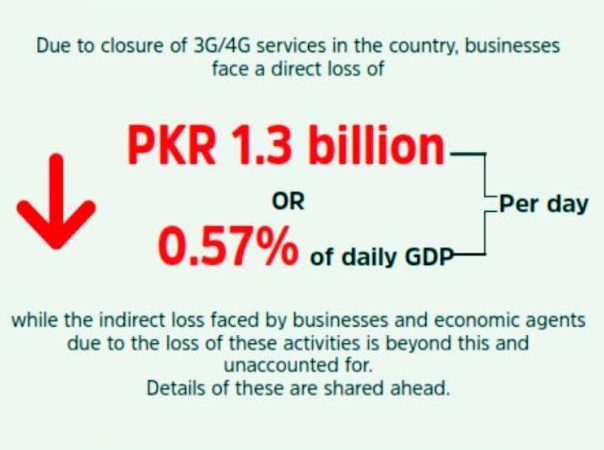PIDE research reveals internet shutdowns cost Pakistan PKR 1.3 bln in direct loss

Islamabad, OCT 8 /DNA/ – In a recent study conducted by the Pakistan Institute of Development Economics (PIDE), startling revelations have emerged regarding the economic impact of internet shutdowns in Pakistan. PIDE estimates show that the closure of internet services for just 24 hours results in a direct loss of PKR 1.3 billion, which equates to a staggering 0.57% of the daily GDP average for the nation.
This eye-opening revelation is part of PIDE’s research infographic titled “The Economic Cost of Internet Closure” and highlights the severe consequences of internet shutdowns on the Pakistani economy.
According to Dr Nadeem ul Haque, Vice Chancellor of the Pakistan Institute of Development Economics (PIDE), and Mr Mohammad Shaaf Najib, Research Fellow at PIDE, the internet has become a fundamental necessity in modern times. However, Pakistan’s internet infrastructure lags behind in terms of both quality and coverage.
The recent internet closure in various parts of Pakistan has had a profound impact on multiple sectors, leading to substantial financial losses and operational challenges. Online cab services, online food delivery services, freelancers, transport companies, and postal services have all been severely affected by the prolonged disruption of internet services.
The PIDE Infographic shows that online Cab Services, a cornerstone of modern transportation, saw a staggering 97% reduction in the number of rides on days when the internet has been closed down. This significant downturn equates to a loss of PKR 29 to 32 million for the industry per day.
Similarly, Online Food Delivery Services suffered a 75% reduction in the number of orders, translating into a substantial daily loss of PKR 135 million.
Meanwhile, the freelance community, which contributes significantly to Pakistan’s economy, has also felt the brunt of internet disruptions. Denial of orders to Pakistan-based freelance workers resulted in over $1.3 million loss of revenue, equaling PKR 390 million, impacting livelihoods of many and the national economy as a whole too.
Besides, suspension of 3G/4G services for a single day causes a loss of PKR 450 million to the telecommunication sector alone.
Furthermore, PIDE had earlier estimated the economic costs of protests to be around 2.0% of the GDP. Closure of economic activity either through protests or due to closure of internet services contributes a significant loss to economic activity in the country.
Dr. Nadeem ul Haque, PIDE’s Vice Chancellor, said in the press release that access to high-quality internet not only enhances opportunities for the youth, particularly in remote areas but also plays a pivotal role in bridging the divide between the privileged and the common public. Utilizing online tools for education and professional purposes can empower youth from rural regions to compete on a national and international level.
PIDE has been a consistent advocate for “Internet for All” and believes that the government must prioritize immediate nationwide internet coverage. Additionally, regulatory measures should be introduced to encourage telecommunication companies to expand internet access across the country. Spectrum auctions should be geared towards ensuring universal internet coverage rather than solely as a means of generating revenue.
The Internet is a critical tool for facilitating economic transactions and business operations. It is disheartening to note that internet shutdowns in Pakistan, often for arbitrary reasons, disrupt essential economic activities.
PIDE is committed to fostering a digital landscape that not only empowers individuals but also contributes positively to Pakistan’s economic growth. The research findings underscore the urgency of addressing the challenges in Pakistan’s internet infrastructure to ensure a prosperous and connected future for all.
Related News

ICCI vows pro-business advocacy
ISLAMABAD, JUL 12 /DNA/ – Nasir Mansoor Qureshi, President of the Islamabad Chamber of CommerceRead More

APBF urges refinement of new tax laws
KARACHI, JUL 12 /DNA/ – The All Pakistan Business Forum (APBF) has taken note ofRead More


Comments are Closed